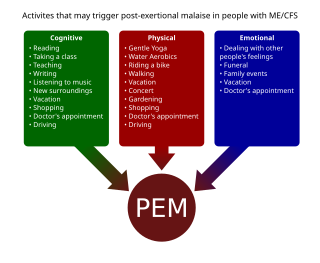Multiple chemical sensitivity (MCS) is an unrecognized and controversial diagnosis characterized by chronic symptoms attributed to exposure to low levels of commonly used chemicals. Symptoms are typically vague and non-specific. They may include fatigue, headaches, nausea, and dizziness.

Fatigue describes a state of tiredness, exhaustion or loss of energy.
Tension myositis syndrome (TMS), also known as tension myoneural syndrome or mindbody syndrome, is a name given by John E. Sarno to what he claimed was a condition of psychogenic musculoskeletal and nerve symptoms, most notably back pain. Sarno described TMS in four books, and stated that the condition may be involved in other pain disorders as well. The treatment protocol for TMS includes education, writing about emotional issues, resumption of a normal lifestyle and, for some patients, support meetings and/or psychotherapy.
Neurasthenia is a term that was first used as early as 1829 for a mechanical weakness of the nerves. It became a major diagnosis in North America during the late nineteenth and early twentieth centuries after neurologist George Miller Beard reintroduced the concept in 1869.

Laura Hillenbrand is an American author. Her two bestselling nonfiction books, Seabiscuit: An American Legend (2001) and Unbroken: A World War II Story of Survival, Resilience, and Redemption (2010), have sold over 13 million copies, and each was adapted for film. Her writing style is distinct from New Journalism, dropping "verbal pyrotechnics" in favor of a stronger focus on the story itself.

Farmer's lung is a hypersensitivity pneumonitis induced by the inhalation of biologic dusts coming from hay dust or mold spores or any other agricultural products. It results in a type III hypersensitivity inflammatory response and can progress to become a chronic condition which is considered potentially dangerous.

Meghan O'Rourke is an American nonfiction writer, poet and critic.

Clinical descriptions of ME/CFS vary. Different groups have produced sets of diagnostic criteria that share many similarities. The biggest differences between criteria are whether post-exertional malaise (PEM) is required, and the number of symptoms needed.
Patricia A. Fennell is the chief executive officer of Albany Health Management Associates. She is a clinician, research scientist, educator, and author specializing in chronic illness, chronic and post-viral syndromes, trauma, forensics, hospice, global health care concerns, autoimmune and post-viral disease, clinical education, and training.

Myalgic encephalomyelitis/chronic fatigue syndrome (ME/CFS) is a disabling chronic illness. People with ME/CFS experience profound fatigue that does not go away with rest, sleep issues, and problems with memory or concentration. Further common symptoms include dizziness, nausea and pain. The hallmark symptom is a worsening of the illness which starts hours to days after minor physical or mental activity. This "crash" can last from hours or days to several months.

Blue Nights is a memoir written by American author Joan Didion, first published in 2011. The memoir is an account of the death of Didion's daughter, Quintana, who died in 2005 at age 39. Didion also discusses her own feelings on parenthood and aging. The title refers to certain times in the "summer solstice [...] when the twilights turn long and blue." Blue Nights is notable for its "nihilistic" attitude towards grief as Didion offers little understanding or explanation of her daughter's death. Writing for The New York Review of Books, Cathleen Schine said,
"'We tell ourselves stories in order to live,' Didion famously wrote in The White Album. Blue Nights is about what happens when there are no more stories we can tell ourselves, no narrative to guide us and make sense out of the chaos, no order, no meaning, no conclusion to the tale."

Unrest is a 2017 documentary film produced and directed by Jennifer Brea. The film tells the story of how Jennifer and her new husband faced an illness that struck Jennifer just before they married. Initially dismissed by doctors, she starts filming herself to document her illness and connects with others who are home- or bedbound with myalgic encephalomyelitis/chronic fatigue syndrome (ME).

Post-exertional malaise (PEM), sometimes referred to as post-exertional symptom exacerbation (PESE) or post-exertional neuroimmune exhaustion (PENE), is a worsening of symptoms that occurs after minimal exertion. It is the hallmark symptom of myalgic encephalomyelitis/chronic fatigue syndrome (ME/CFS) and common in long COVID and fibromyalgia. PEM is often severe enough to be disabling, and is triggered by ordinary activities that healthy people tolerate. Typically, it begins 12–48 hours after the activity that triggers it, and lasts for days, but this is highly variable and may persist much longer. Management of PEM is symptom-based, and patients are recommended to pace their activities to avoid triggering PEM.
Diagnosis is a 2019 documentary television series. The series follows Dr. Lisa Sanders as she attempts to help patients with rare illnesses and searches for a diagnosis and cure using wisdom of the crowd methods. The show is based on her column for The New York Times Magazine. It was released on August 16, 2019, on Netflix.
Sonya Huber is an American essayist and writer of memoir and literary nonfiction. She is an associate professor of creative writing at Fairfield University. She is the author of Pain Woman Takes Your Keys and Other Essays from a Nervous System, Cover Me: A Health Insurance Memoir, Opa Nobody, and other books. Huber's essays have appeared in Creative Nonfiction, Brevity, Hotel Amerika, LitHub, The Rumpus, River Teeth, among other literary journals, and in The New York Times, The Atlantic, The Chronicle of Higher Education, the Washington Post, and the Washington Post Magazine.

Perfect Chaos is a 2012 memoir co-written by Linea Johnson and her mother, Cinda Johnson. The book follows a mother-daughter journey of the struggle of the diagnosis and living with bipolar disorder and depression.
Amy Proal is an American microbiologist who studies the effects of bacterial, fungal, and viral pathogens on human health at the molecular level. She is one of the founders of PolyBio Research Foundation, a company investigating the basis of chronic infection-associated illnesses, and currently serves on the company's board of directors. She has recently been noted for her work investigating the causes of long covid.
Erin Williams is an American author, illustrator, cartoonist, and researcher. The author and illustrator of Commute: An Illustrated Memoir of Female Shame, and What's Wrong: Personal Histories of Chronic Pain and Bad Medicine, her graphic narratives cover chronic pain and illness, alcoholism, sexual assault, motherhood, and gender.
Strangers to Ourselves: Unsettled Minds and the Stories That Make Us is a 2022 non-fiction book by Rachel Aviv that focuses on mental illness, diagnosis, and people in extreme mental distress. It was listed among the New York Times’ "The 10 Best Books of 2022".

The Undying: Pain, Vulnerability, Mortality, Medicine, Art, Time, Dreams, Data, Exhaustion, Cancer, and Care is a 2019 non-fiction book by the American author, poet, and essayist, Anne Boyer. The memoir chronicles Boyer's experience as a breast cancer patient. Boyer takes an untraditional approach to the standard illness narrative, by weaving together her personal journey as a patient in treatment with reflections on art and literature, and critiques of capitalism and the medical industry.










